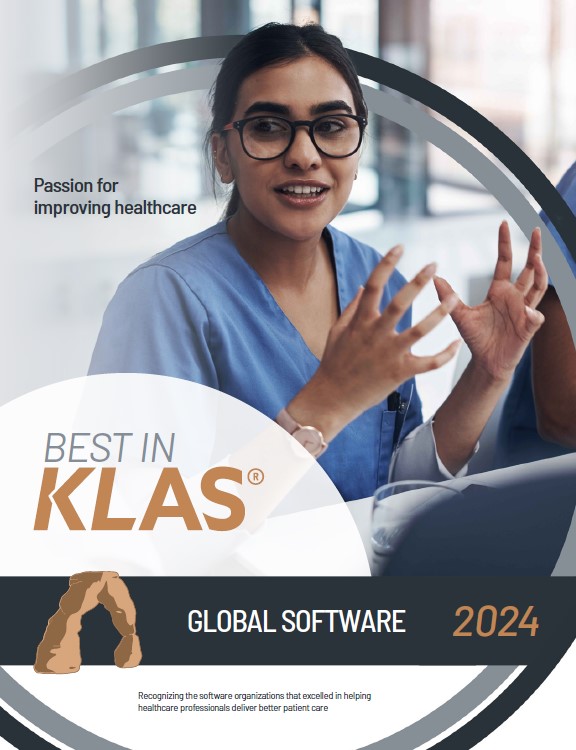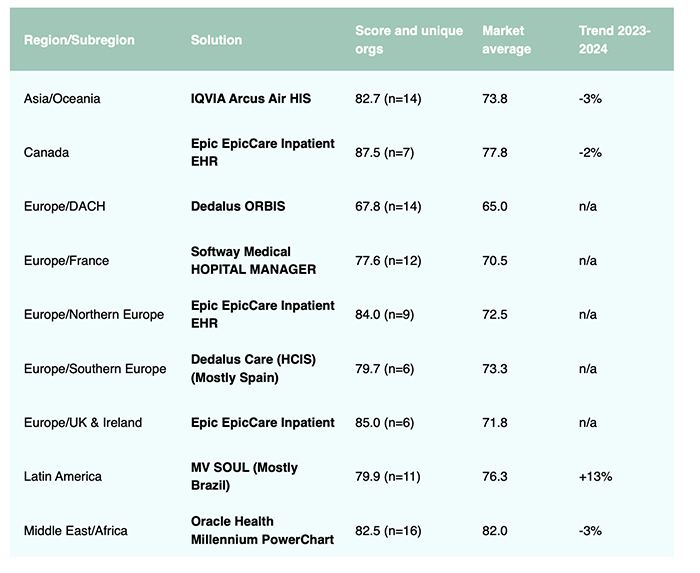HealthManagement, Volume 24 - Issue 1, 2024
An overview of the 2024 Best in KLAS Awards – Global Software report providing insight on the most effective software solutions in healthcare.
Key Points
- The Best in KLAS® awards serve as a guide, helping stakeholders easily see the most effective software solutions that elevate the standard of care.
- The research directly represents the provider voice in each region an award is given and acts as a catalyst for improving vendor performance.
- The 2024 Global Best in KLAS report reflects expanded research in Europe by KLAS, with subregional awards given in the UK and Ireland, Northern Europe, DACH, France, and Southern Europe.
- The 2024 Best in KLAS – Global Software report is a big step forward in Europe – and the world.
In the realm of healthcare technology, the Best in KLAS® awards serve as a guide, helping stakeholders easily see the most effective software solutions that elevate the standard of care. The 2024 Best in KLAS Awards – Global Software report represents a big step forward into the European healthcare IT market as more feedback enabled KLAS to present more Best in KLAS awards than ever before.
KLAS is a research and insights firm on a global mission to improve healthcare delivery by amplifying the provider's voice. Working with thousands of healthcare professionals and clinicians worldwide, KLAS gathers data and insights on software and services to deliver timely reports, trends, and statistical overviews. The research directly represents the provider voice in each region an award is given and acts as a catalyst for improving vendor performance.

2024 Awards Given in More European Market Segments
The 2024 Global Best in KLAS report reflects expanded research in Europe by KLAS, with subregional awards given in the UK and Ireland, Northern Europe, DACH, France, and Southern Europe. Jonathan Christensen, senior insights director at KLAS, shared, “KLAS continues to see more feedback from and engagement in Europe. This year is the first that KLAS has been able to highlight vendor performance at a more granular, subregional level for Europe. Publishing this more granular look is better for provider organisations because it gives increased clarity on which vendors are selling in the region that have an established presence. More importantly, it shows which vendors are performing well.
KLAS’ goal is to continually refine and to get better as we increase our research efforts to try and make the report as relevant and applicable as possible for the providers in their own geography. The 2024 Best in KLAS – Global Software report is a big step forward in Europe – and the world, and we're going to continue to grow our presence and feedback from other regions in the future.”
Selected Best in KLAS Award Winners – Global
Global Acute Care EHR
Outside of the US, KLAS defines Electronic Health Record (EHR) software products as providing core inpatient functionality, including a clinical data repository, order entry, ePrescribing, results reporting, and/or clinician charting and documentation.

To see Best in KLAS winners in different regions for Digital Pathology, PACS, and Shared Care Records/HIE, please see the full report.
Key Takeaways and Trends from 2024
Increased Focus on Patient Engagement: Healthcare organisations worldwide are placing greater emphasis on engaging patients throughout their healthcare journey. According to KLAS interviews, nearly two-thirds of organisations prioritise patient engagement technology for IT investment in the next one to two years. Many are already utilising such technologies, with future plans to consolidate functionalities through patient portals and streamline access to healthcare services.
Continued Emphasis on EHR Optimisation and Expansion: Healthcare organisations globally are persistently investing in optimising existing technologies, particularly Electronic Health Records (EHR). This involves enhancing adoption and usability across clinical areas and harnessing data-driven capabilities from EHR vendors to improve operations. KLAS will release reports in 2024 focusing on EHR adoption and performance in the Middle East/Africa and the UK/Ireland regions.
Migration Towards Cloud-Based Solutions: Simultaneously with EHR optimisation, many healthcare organisations are modernising and lightening their IT infrastructure by embracing cloud technologies. While still in the early stages, over two-thirds of organisations are in the process of adopting cloud solutions. Moreover, cloud strategy and transformation rank high among the areas where healthcare organisations seek advisory services from firms.
Why Granularity Matters and Factors Impacting Best in KLAS Vendor Scores
Producing a meaningful international report can be a challenge thanks to the vast amounts of data required, but KLAS feels it is worth the effort. Christensen makes it clear that the goal with the global Best in KLAS report has always been to acknowledge strong vendor performance at a more sub-regional or even country level because “KLAS recognises the diversity in the vendors and their performance based on language, regionality, and local regulations and support. So, we have continued to push to get more granular to better highlight these differences.”
Depending on the region, various factors make an impact on customer satisfaction with their solutions, which can set the winners apart. Christensen shares a few: “One factor that influences how well a vendor does in a region is how they, or their reseller, meet basic support requests from customers in country. What we generally see is that vendors who are Best in KLAS are better able to deal with those support requests. They’re also better at meeting the local regulations. As we look at these regional Best in KLAS awards in Europe, it allows for an apples-to-apples comparison of vendors against the same regional expectations. It is still not perfect, but these changes have allowed us to better highlight feedback from like-minded organisations on how well vendors meet their local needs.”
Ironclad Methodology: sampling selection, data thresholds and ranking criteria
At the core of the Global Best in KLAS report is a methodology aimed at evaluating software solutions on their overall performance. The data, for both the US and global reports, is based on over 26,000 conversations each year with the customers of over 1,100 tracked products from more than 5,000 healthcare organisations. To avoid relying on vendors to obtain client lists, KLAS makes proactive calls to tens of thousands of healthcare professionals. Data is also obtained from user groups, referrals, and online.
KLAS makes every effort to build strong, mutually beneficial relationships with providers, and this helps produce a higher response rate. So, when randomly selecting a sample within known customer bases, KLAS cannot fully control for the nonresponse bias when customers do not participate. However, many do respond. Additionally, to allow for the representation of differing perspectives within any customer organisation, samples may include individuals from the same organisation. The evaluation period spans either 13 or 19 months, depending on the solution type, ensuring a comprehensive analysis of performance trends.
While data thresholds are higher for research gathered in the US, to be considered fully rated data in non-US regions, solutions needed a sample size of 6 or more unique organisations. Meanwhile, sample sizes of 3-5 unique organisations are marked as limited data.
Customer Experience Pillars and Eligibility Criteria
To accurately reflect the sentiment of customers and offer readers an at-a-glance overview of vendor performance, evaluation is segmented into six customer experience pillars: culture, loyalty, operations, product, relationship, and value. Scores on a 100-point scale are translated into alphabetical grades from F to A+.
Not all solutions are eligible for a Best in KLAS ranking. In these cases, overall performance scores and customer experience pillar grades are still displayed, along with the reason for ineligibility among the following:
- Limited Data: Solutions with sample sizes below required thresholds, though they may meet lower "limited data" thresholds.
- Newly rated [NR]: Solutions rated after the Best in KLAS report deadline.
- Not eligible [NE]: In regions outside of the US, Acute care EHR solutions must have evaluations from two or more countries within the region, and at least one customer must be a HIMSS Level 6+ as verified by KLAS. PACS systems must have the same number of evaluations, and at least one customer in the region needs to manage 300,000+ images per year.
- Not primary [NP]: Solutions that are not a vendor's lead offering in a market segment.
- Regional [R]: Solutions with data primarily sourced from a small, specific geographical area.
In the realm of healthcare technology, the KLAS Rankings serve as a beacon guiding stakeholders towards the most effective software and services solutions that elevate the standard of care. Within this expansive landscape, understanding the intricacies of the ranking system is paramount for informed decision-making.
















